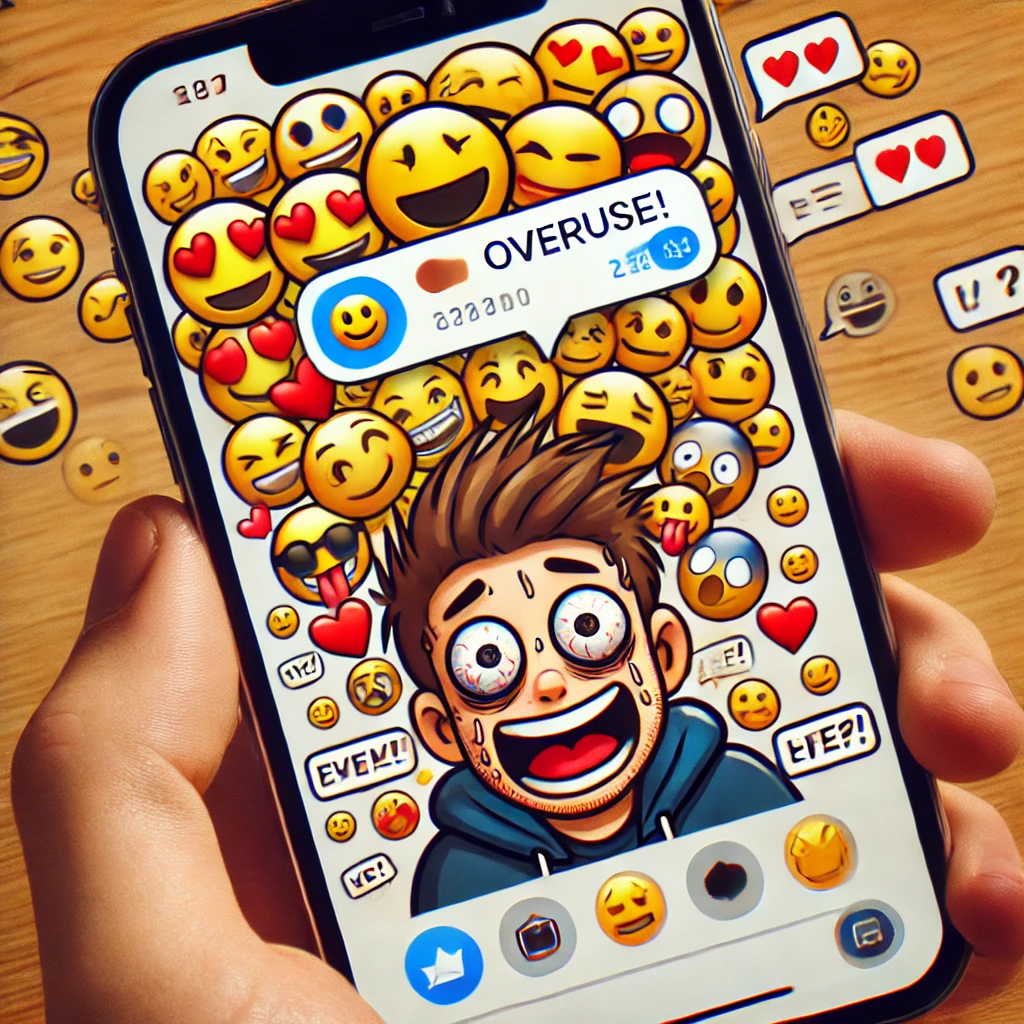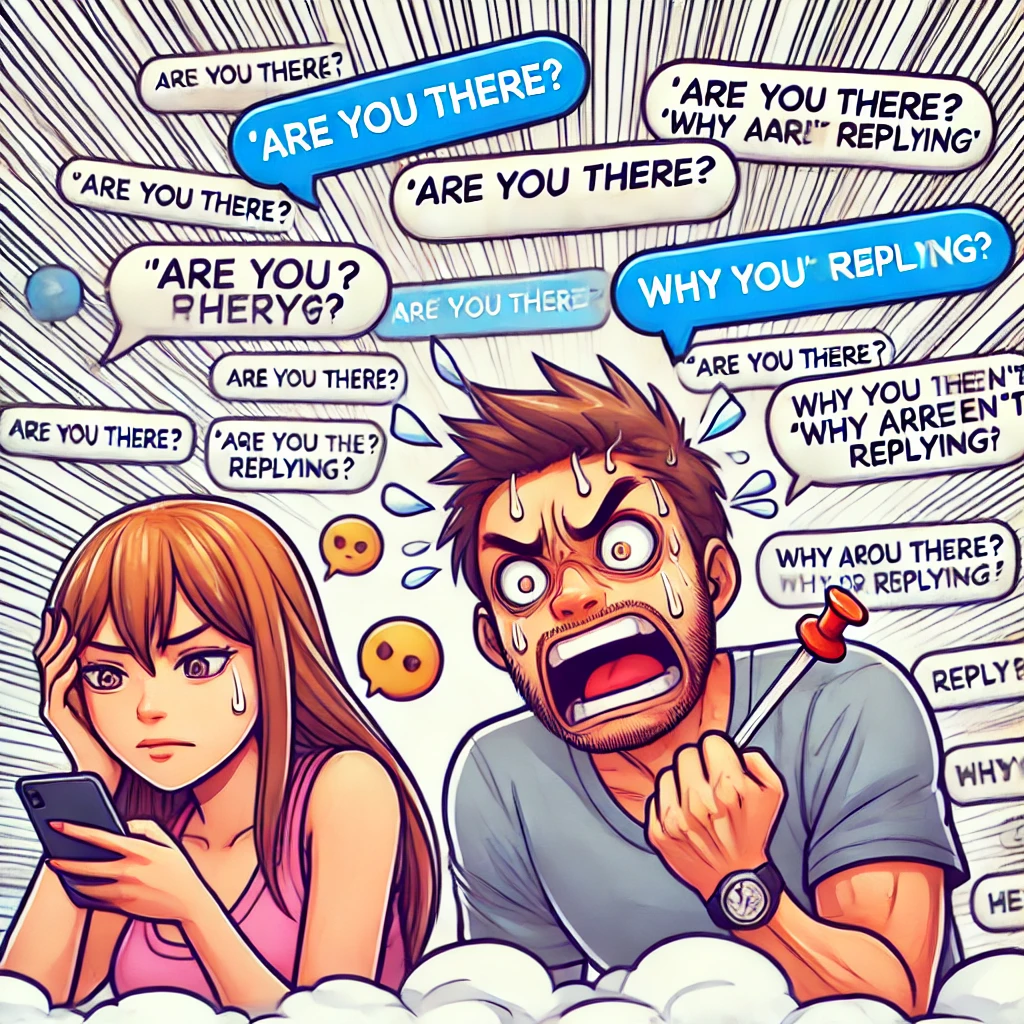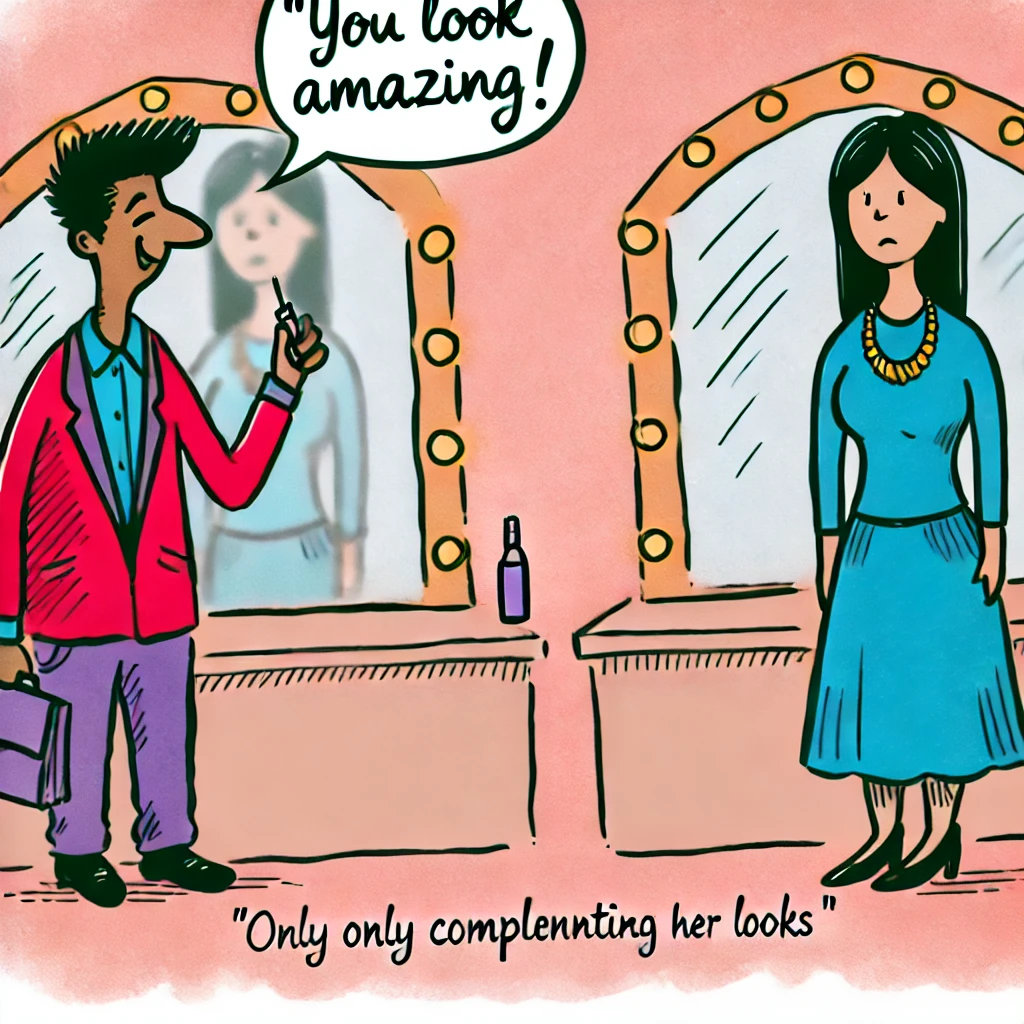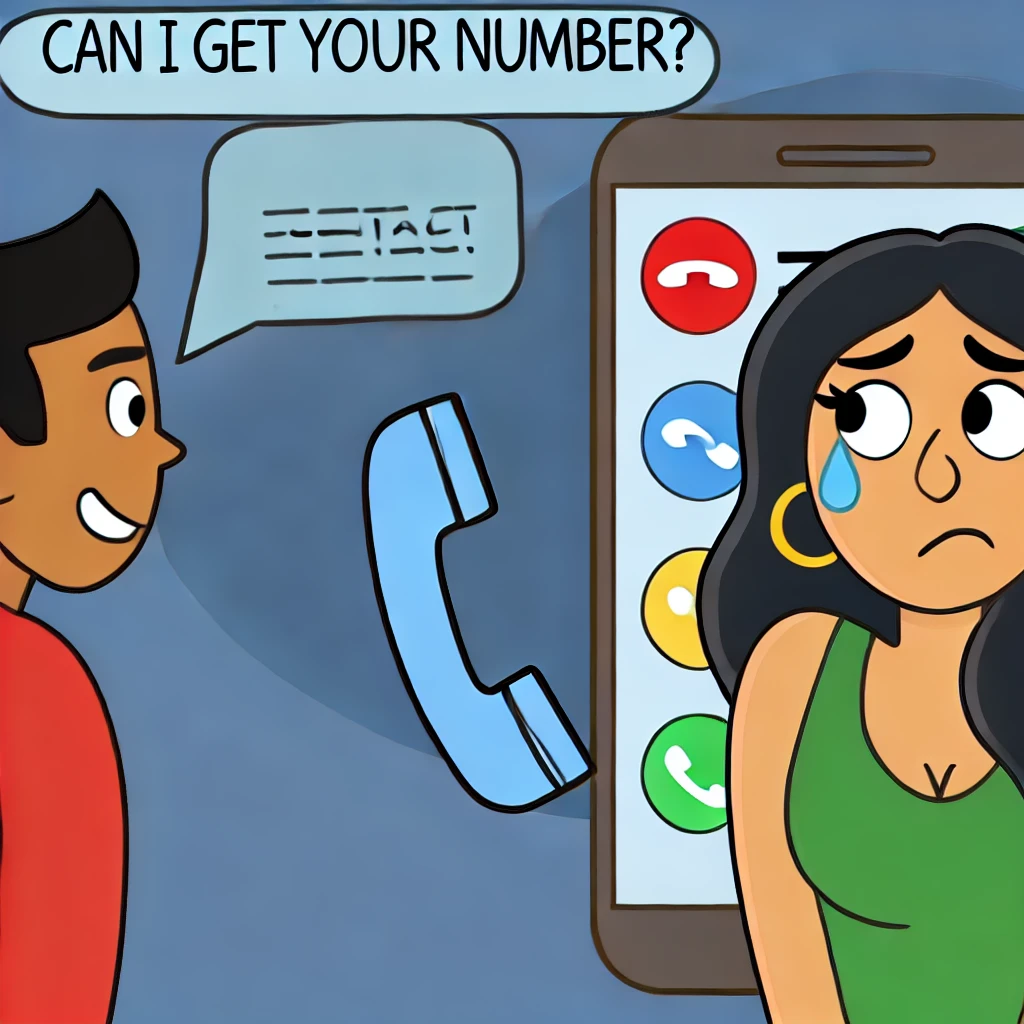Introduction
Online dating has become a common way to meet new people in our modern world. Picture this: you’re relaxing at home, scrolling through profiles on your favorite dating app, when someone special catches your eye. Your heart skips a beat, and you want to say something memorable. But what should you say? A simple “hi” might seem too bland, and you want to avoid making a bad first impression.
Many men stumble at this crucial moment, making mistakes that could easily be avoided. From unoriginal pickup lines to overly flattering compliments, these common errors often lead to missed connections. In this guide, we’ll explore some of the most frequent mistakes men make when greeting online and provide tips on how to avoid them, ensuring that your messages stand out for all the right reasons.
1. Monotonous Opening Lines
Starting a conversation with “hi” or “hello” might seem like a safe choice, but it’s also one of the most uninspiring. It’s like attending a party and merely nodding at everyone—forgettable and lacking in effort. In the vast sea of online profiles, a bland greeting won’t help you stand out.【Related: How to Write Creative Opening Lines for Online Dating 】
Why It Fails: Such openings lack creativity and fail to capture attention. They’re overused and give the impression that you didn’t put any thought into your message.
Better Approach: Personalize your greeting by referencing something specific from the person’s profile. For example, if they mention loving travel, you could say: “Hi! I noticed you love traveling. What’s the best place you’ve visited?” This shows that you’ve taken the time to read their profile and are genuinely interested in getting to know them.
2. Overusing Emojis

Emojis can add a fun and playful element to your messages, but overusing them can make you seem immature or insincere. Imagine receiving a message that looks like this: “Hi 😊😊😊 How are you??? 😍😍😍” It’s overwhelming and can come off as trying too hard.
Why It Fails: Overloading your message with emojis can make you seem unserious or overly casual, undermining your sincerity.
Better Approach: Use emojis sparingly to complement your words, not replace them. A simple smiley face can enhance a friendly tone, but your words should carry the main message. For example, “Hi! I noticed you love hiking 😊 Do you have a favorite trail?” This balance keeps your message friendly without overwhelming the recipient.
3. Exaggerated Self-Promotion
Bragging about your accomplishments, like “I graduated from a top university and earn a six-figure salary,” might seem like a way to impress, but it often backfires. It can come across as arrogant and off-putting.【Related: How to Introduce Yourself Without Bragging】
Why It Fails: Exaggerated self-promotion often feels insincere and can alienate the other person. It might make them feel like you’re trying to overshadow or impress them rather than connect on a genuine level.
Better Approach: Be humble and genuine. Share your interests or recent experiences without boasting. For example, “I recently started learning photography, and it’s been an exciting journey. Do you have any hobbies you’re passionate about?” This approach invites the other person to share and creates a more balanced conversation.
4. Uncreative Pickup Lines
Lines like “What are you doing?” or “Are you busy?” are not only bland but also don’t provide a strong foundation for an engaging conversation. They’re like filler questions that don’t require much effort to answer.【Related: Creative and Fun Pickup Lines That Actually Work】
Why It Fails: They offer no substance and fail to engage the other person. It’s a missed opportunity to connect on a more meaningful level.
Better Approach: Ask open-ended questions that invite detailed responses. For instance, “What’s the most interesting book you’ve read recently?” or “If you could travel anywhere right now, where would it be and why?” These questions encourage the other person to share more about themselves, making the conversation more dynamic and engaging.
5. Overly Flattering Compliments
Compliments like “You’re the most beautiful person I’ve ever seen” might seem flattering, but they can also come across as insincere or even creepy. When someone you’ve never met starts with such intense compliments, it can feel overwhelming.
Why It Fails: Over-the-top compliments can make you seem untruthful or overly eager, as if you’re trying to win favor rather than genuinely appreciating the person.
Better Approach: Be specific and genuine with your compliments. Focus on something unique that you genuinely find appealing, such as their sense of humor, style, or an interesting aspect of their profile. For example, “I really like your taste in music; it’s rare to find someone else who enjoys jazz!”
6. Asking Personal Questions Too Soon
Jumping into personal questions like “Where do you live?” or “How old are you?” can feel invasive, especially when you’re just starting to get to know someone.
Why It Fails: These questions can feel too personal too quickly, making the other person uncomfortable and defensive. It can also come off as lacking respect for boundaries.
Better Approach: Start with lighter, more general topics and build up to more personal questions as trust develops. For example, instead of asking directly about age, you could discuss interests or hobbies and naturally let the conversation flow to more personal details over time.
7. Frequent Messaging

Sending a barrage of messages like “Are you there?” “Why aren’t you replying?” can be overwhelming and off-putting. It might give the impression that you’re too eager or even desperate.
Why It Fails: It can come across as needy or pushy, putting undue pressure on the other person to respond.
Better Approach: Be patient. Allow time for the other person to respond and maintain a relaxed frequency in your communication. For instance, if you haven’t heard back, give it some time before sending another message. Patience shows respect for the other person’s time and space.
8. Negative Emotions and Pessimistic Topics
Starting a conversation with complaints or negative comments, such as “I’ve had such a bad day” or “I’m losing faith in humanity,” sets a poor tone for the interaction.
Why It Fails: Negative emotions can make you seem like a downer, not someone people want to engage with. It can also make the conversation feel heavy and uncomfortable.
Better Approach: Keep the conversation positive and light, sharing enjoyable experiences or interests. For example, “I recently discovered a new hobby, and it’s been so much fun! Do you have any hobbies you love?” This sets a positive tone and opens the door for the other person to share happy experiences.
9. Inappropriate Language or Grammatical Errors
Messages riddled with slang, typos, or grammatical mistakes, like “What r u doin?” or “Long time no c,” can undermine your credibility and seriousness.
Why It Fails: It suggests a lack of effort or education, making a poor impression and potentially making you seem careless or uninterested.
Better Approach: Take the time to proofread your messages, ensuring they are clear and grammatically correct. For example, “What are you doing this weekend?” shows attention to detail and respect for the other person.
10. Lack of Humor
While being serious has its place, a completely serious tone can make the conversation feel stiff and uninviting.
Why It Fails: Humor helps to break the ice and establish a connection, making the conversation more enjoyable and relatable.
Better Approach: Light humor or self-deprecation can make you seem approachable and easy-going. For example, “I tried cooking last night and ended up with something even my dog wouldn’t eat. Ever had a kitchen disaster?” This shows a relaxed, approachable side and invites the other person to share similar stories.
11. Using Old Pickup Lines
Outdated lines like “Did it hurt when you fell from heaven?” are clichéd and often come across as insincere.
Why It Fails: They show a lack of originality and effort, which can make the other person feel like you’re not genuinely interested.
Better Approach: Be authentic and creative with your opening lines. Instead of relying on old clichés, reference something specific from the person’s profile or share an interesting fact about yourself that can lead to a deeper conversation.
12. Focusing Too Much on Appearance

While it’s natural to notice someone’s looks, focusing solely on their appearance can seem shallow and reduce them to just their looks.
Why It Fails: It suggests you’re only interested in surface-level attributes, potentially making the other person feel objectified.
Better Approach: Compliment their interests, achievements, or qualities that stand out to you. For instance, “Your passion for volunteering is really inspiring. How did you get started?” This shows that you’re interested in who they are as a person, not just their appearance.
13. Ignoring the Other Person’s Interests
If you dominate the conversation with your interests and ignore what the other person enjoys, it can make you seem self-centered and uninterested in getting to know them.
Why It Fails: It creates a one-sided conversation and can make the other person feel undervalued.
Better Approach: Show genuine interest in the other person’s hobbies and passions. Ask questions like, “I see you love painting; what’s your favorite style?” This demonstrates that you’re attentive and eager to learn more about them.
14. Using Overly Complex Language
Using big words or jargon in an attempt to impress can backfire, making the conversation feel pretentious or inaccessible.
Why It Fails: It can create a barrier to understanding and make the other person feel like you’re trying too hard to impress rather than connect.
Better Approach: Use clear and simple language. The goal is to communicate effectively and make a connection, not to showcase your vocabulary. For instance, instead of saying “My interests lie in the esoteric realms of quantum physics,” you could say, “I love learning about science and the mysteries of the universe.”
15. Too Casual a Tone
Starting with overly casual phrases like “Hey dude!” can come off as too laid-back and lacking in seriousness.
Why It Fails: It can make you seem like you’re not taking the conversation seriously, potentially reducing the other person’s interest in engaging with you.
Better Approach: Strike a balance between casual and respectful. Use greetings like “Hi there!” or “Hello!” to keep things friendly yet polite. This approach shows that you’re approachable while still being respectful.
16. Ignoring the Other Person’s Feedback
If the other person shares something about themselves and you don’t acknowledge it, it can seem like you’re not paying attention or aren’t interested.
Why It Fails: It shows a lack of engagement and interest, making the conversation feel one-sided and impersonal.
Better Approach: Actively listen and respond to what the other person shares. For example, if they mention they love hiking, you could ask, “That’s great! What’s the most memorable hike you’ve been on?” This keeps the conversation flowing and shows that you value their input.
17. Using Old Social Media Jargon
Outdated slang or memes can make you seem out of touch and disconnected from current trends.
Why It Fails: It can make the conversation feel dated and reduce your appeal.
Better Approach: Stay updated with current trends, but use them sparingly and appropriately. It’s more important to be genuine and timely rather than relying on trendy language.
18. Prying Into Personal Issues

Asking about deeply personal issues or sensitive topics too soon can make the other person feel uncomfortable and defensive.
Why It Fails: It can come across as intrusive and disrespectful, potentially ending the conversation prematurely.
Better Approach: Start with light and neutral topics, gradually building trust before delving into more personal areas. Respect boundaries and let the other person lead the way in sharing personal details.
19. Ignoring Cultural Differences
Overlooking or misunderstanding cultural nuances can lead to awkward or even offensive interactions.
Why It Fails: It shows a lack of cultural sensitivity and awareness, which can be off-putting and disrespectful.
Better Approach: Be open and curious about the other person’s background. Ask thoughtful questions and show a genuine interest in learning about their culture. This approach not only prevents misunderstandings but also enriches the conversation.
20. Forcing Quick Replies
Pressuring the other person to respond quickly, such as by repeatedly asking “Why aren’t you replying?” can be annoying and make them feel rushed.
Why It Fails: It can make you seem impatient and inconsiderate, reducing the likelihood of a positive response.
Better Approach: Be patient and respectful of the other person’s time. Give them space to respond at their own pace. Remember, everyone has a life outside of online conversations, and patience shows maturity and respect.
21. Being Too Formal or Businesslike
Using overly formal language can create an impression of stiffness and distance, which isn’t conducive to building a personal connection.
Why It Fails: It can make the conversation feel cold and impersonal, reducing engagement and relatability.
Better Approach: Maintain a friendly yet respectful tone. Use conversational language that feels natural and approachable, helping to create a warm and inviting atmosphere.
22. Talking About Exes
Bringing up ex-partners, especially early in the conversation, can be awkward and unnecessary. It might give the impression that you’re not over past relationships.【Related: Why You Should Avoid Talking About Exes in Online Dating】
Why It Fails: It suggests you’re still hung up on past relationships and might not be ready for new ones.
Better Approach: Focus on the present and what you’re looking for in the future. If the topic of past relationships does come up, keep it brief and positive, and quickly steer the conversation back to lighter, more relevant topics.
23. Asking for Contact Information Too Soon

Being too eager to exchange contact information, such as asking for someone’s phone number or social media handle right away, can be off-putting.
Why It Fails: It can make the other person feel rushed and uncomfortable, as if you’re pushing for something too quickly.
Better Approach: Build rapport and establish a comfortable connection before suggesting moving the conversation off the platform. For example, after a pleasant exchange, you might say, “I’ve really enjoyed our conversation. Would you like to continue chatting on WhatsApp/Instagram…?”
24. Using Auto-Reply Tools
Relying on automated messages or chatbots can make your interactions feel impersonal and disingenuous.
Why It Fails: It suggests you’re not genuinely interested in the conversation and are taking a shortcut instead of putting in effort.
Better Approach: Craft personalized messages that reflect your genuine interest and engagement. Show that you’re paying attention to the specific details of the other person’s profile and what they’ve shared.
25. Ignoring the Other Person’s Introduction
If someone introduces themselves and you don’t acknowledge it, you risk seeming rude or uninterested.
Why It Fails: It can come off as dismissive and unengaged, which is not a good foundation for any conversation.
Better Approach: Respond to their introduction with interest and ask follow-up questions to keep the conversation going. For example, if they mention they’re into cooking, you could ask, “That’s great! What’s your favorite dish to cook?”
26. Pretending Interest in Topics
Pretending to share an interest in something just to impress the other person can backfire if you’re not knowledgeable or genuinely interested.
Why It Fails: It can make you seem insincere and trying too hard, which is unattractive.
Better Approach: Be honest about your interests. If you’re not familiar with a topic, express curiosity instead. For example, “I don’t know much about that genre, but I’m always looking for new recommendations. What would you suggest I start with?”
27. Using Too Many Abbreviations
Overusing abbreviations or text lingo, like “lol” or “idk,” can make your messages hard to read and come off as lazy.
Why It Fails: It can make the conversation feel rushed and lacking in effort, potentially confusing the other person.
Better Approach: Use full sentences and proper punctuation to convey your messages clearly and professionally. This shows that you’re taking the conversation seriously and making an effort to communicate effectively.
28. Impatience in Building Connection
Rushing the conversation or pushing for rapid progress, such as quickly suggesting a meet-up, can be off-putting.
Why It Fails: It can make you seem desperate or overly eager, which might scare off potential matches.
Better Approach: Take your time to build a connection. Let the conversation flow naturally and progress at a comfortable pace for both parties. Patience shows respect and increases the likelihood of a positive outcome.
29. Ignoring the Other Person’s Emotional State

Failing to acknowledge someone’s feelings or emotional state can come off as insensitive. For example, if they mention having a bad day and you ignore it, it shows a lack of empathy.
Why It Fails: It demonstrates a lack of consideration and can make the other person feel undervalued or ignored.
Better Approach: Show empathy and understanding. If they mention they’re feeling down, you might say, “I’m sorry to hear that. If you want to talk about it, I’m here to listen.” This demonstrates that you care and are willing to support them.
Conclusion
Navigating the world of online dating can be challenging, but avoiding these common mistakes can significantly improve your chances of making a positive impression. Whether you’re using apps focused on serious relationships or casual connections, it’s crucial to approach each conversation with authenticity and respect.
Remember, the key to a successful online conversation is to be genuine and respectful. Let your unique personality shine through, and take the time to get to know the other person. With these tips and a thoughtful approach, you can make meaningful connections and enjoy a rewarding online dating experience.



